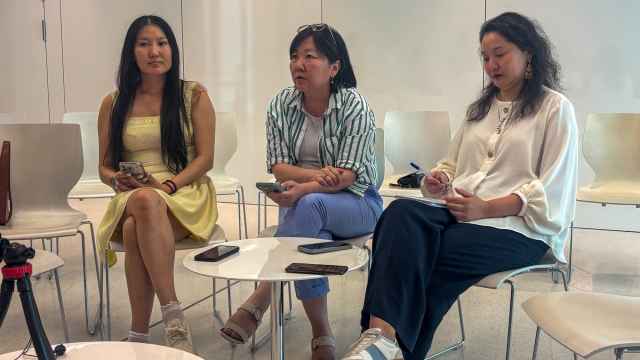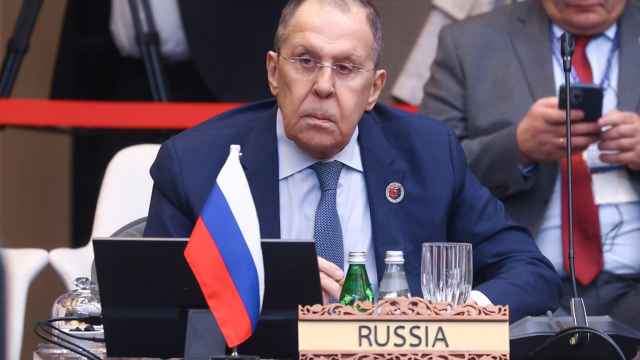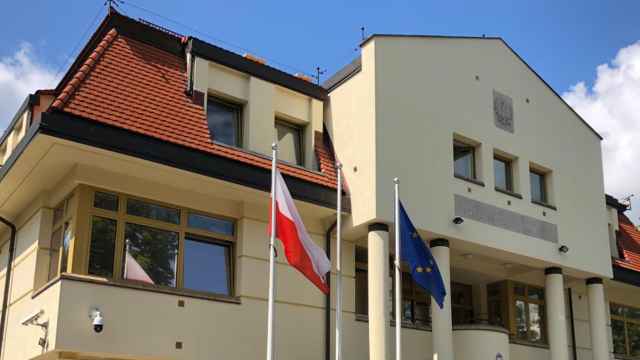Editor’s note: This is the last in a series of articles about how Russians live in Britain.
LONDON — For some, the paraphernalia of Slavic food shops, cultural organizations promoting anything from Leo Tolstoy to Nikita Mikhalkov, and Russian-language newspapers in London are a comforting indication of a thriving ethnic community. For others it is a mere illusion.
“It is all rubbish,” said Zinovy Zinik, a Russian-born author who has lived in London since 1976. “There is no such thing as a Russian community in London. … Anyone with a vestige of brains would try to dissociate himself from such an entity.”
The idea of such a community, he told The Moscow Times, “presumes that people of the same ethnic origin abroad always stick together — it implies collective responsibility and conspiratorial tendencies.”
Zinik, who referred to himself as a “red emigre” — someone who left the Soviet Union — has been in Britain for longer than he ever lived in Russia. He no longer owns a Russian passport.
He said his English prose is a vehicle for establishing his British credentials — and shaking off his immigrant identity. He joked that Alexander Lebedev, the Russian businessman worth about $2 billion who purchased four major British newspapers in 2010, has a similar agenda.
Part of a segment of Russians in London who are, like the oligarchs, hugely outnumbered in the wake of economic migrations over the last two decades, Zinik conceded that there may be one issue that draws Russians in London together.
“If Russians abroad are united in anything, it is their fear of the Russian government and of their compatriots,” Zinik said. “Some of them have more money, others less, some feel more independent of their fears, others not so, but they all dread the thought of being entrapped in Russia again.”
“Institutional manifestations of the Russian presence in the U.K. are either fake — like ‘independent’ newspapers in Russian — or boring and provincial,” he added.
There is long tradition of Russian literary and political figures living as exiles in London — from Alexander Herzen and anarchists Mikhail Bakunin and Prince Kropotkin in the 19th century to Soviet dissidents in the 20th.
Even Lenin sought refuge in London at the beginning of the 20th century, frequenting the Georgian terrace streets of Holford Square, Great Russell Street and Clerkenwell Green and jumping on open-top buses for sightseeing trips. He named London his favorite European city, along with Geneva.
In one of Zinik’s semiautobiographical short stories, “A Voice Behind,” he describes a feeling of shame in being recognized as a Russian while walking London’s streets.
“The fear of being identified as a Russian is in our blood,” says the story’s narrator, “it takes some psychological self-training not to feel slightly embarrassed each time my Russian origin is exposed in the company of Brits.”
Such a fear does not, however, bother the majority of recent economic migrants who congregate in such places as Stratford, East London, where the sound of spoken Russian is impossible to miss.
Not every recent Russian settler in Britain, however, is motivated purely by economics. Sergei Grachev, a psychoanalyst and psychotherapist in private practice, left Moscow for London in 1996 — a decision taken on professional grounds. Proper psychoanalytical training was not available in Russia in the 1990s.
Like Zinik, Grachev is also dismissive of the concept of a Russian community. Russians abroad are, he said, “terribly embarrassed by each other.” He compared the feeling to that of a teenager in the presence of his parents.
Though he had the opportunity to move the United States, Grachev ultimately chose London based on “simple” criteria. “It is not that far away from Moscow,” he said.
Grachev survived a period of great homesickness — when he felt that “the sky was lower in Britain”— not by seeking out other Russians, but through the discovery of points of familiarity. He found an outlet for his love of all things arboreal in Britain’s New Forest — a long drive from London but a place he likes to visit.
His children have learned his native language, and he speaks Russian with some of the patients who come to him for treatment. “Language,” said Grachev, “includes the smell of rye bread and the height of the sky.”
Though he may be a part of the same intellectual tradition of Russians in London as Zinik, Grachev said he understands but does not share their disgust with “bad Mother Russia.”
“Some people,” he said, citing negative media reports about the land of his birth, “believe there is nothing to be proud about.”
Grachev maintains a home in Moscow and returns regularly to visit friends and family, as well as to teach. He said he would like to return one day, but admits this would be difficult as London is his home now.
Before emigrating, he saw the world divided between Russia “and everywhere [else].” But he said since starting a second life in London his worldview had polarized to “here and there.”
A Message from The Moscow Times:
Dear readers,
We are facing unprecedented challenges. Russia's Prosecutor General's Office has designated The Moscow Times as an "undesirable" organization, criminalizing our work and putting our staff at risk of prosecution. This follows our earlier unjust labeling as a "foreign agent."
These actions are direct attempts to silence independent journalism in Russia. The authorities claim our work "discredits the decisions of the Russian leadership." We see things differently: we strive to provide accurate, unbiased reporting on Russia.
We, the journalists of The Moscow Times, refuse to be silenced. But to continue our work, we need your help.
Your support, no matter how small, makes a world of difference. If you can, please support us monthly starting from just $2. It's quick to set up, and every contribution makes a significant impact.
By supporting The Moscow Times, you're defending open, independent journalism in the face of repression. Thank you for standing with us.
Remind me later.







